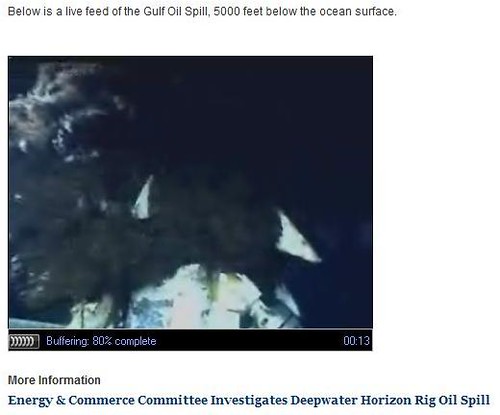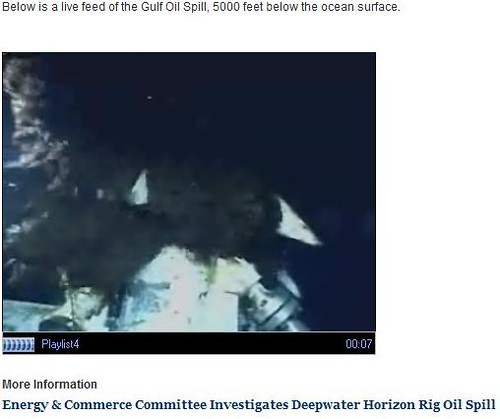
If it sometimes seems difficult to tell whether BP or Adm. Thad Allen is the bigger liar, that's generally because Thad tends to repeat all of BP's talking points -- a strange habit for a supposed government employee and Coast Guard commander. The tag-team can't even keep their lies straight.
Nicholas Jonston and John McCormick (Bloomberg News) reported Friday, "Recovery of oil aboard the drillship began about midnight and may have reached a rate of 1,000 barrels a day, based on a BP estimate, Allen said during a conference call with reporters." Quick question: Why doesn't the government -- supposedly utilizing scientists -- have their own estimate or is Thad just such a whore that he didn't think it was necessary? By Saturday Whore Thad was insisting it was even more than that. Dave Gustafson (PBS' NewsHour) reports Thad was claiming 6,000 barrels. And we all know That was speaking with BP's hand up his ass. So it was no surprise to read AP's report that BP's Tony Hayward was insisting today on the BBC that it was "capturing 10,000 barrels of oil per day." That's how it works, they lie, get away with it and come back and lie some more.
Of course, if you want to talk lies, remember when BP was insisting (and many in the press were echoing) that the Gulf Disaster could be no more than 5,000 barrels a day leaking into the ocean?
If you still doubt how serious the disaster is, you obviously gave no money to Democrats in 2008. That's the only way they could have missed you when, on Saturday, they sent out "The Gulf Coast," an e-mail that opened with your first name and then a 'message' from US President Barack Obama:
Yesterday, I visited Caminada Bay in Grand Isle, Louisiana -- one of the first places to feel the devastation wrought by the oil spill in the Gulf of Mexico. While I was here, at Camerdelle's Live Bait shop, I met with a group of local residents and small business owners.
His heavy on the "I" statements weren't surprising, nor was his switch to "we" when it was time to take responsibility. (You really didn't think he'd say "I" there, did you?) Joel Achenbach and David Brown (Washington Post) report this morning:
Some of the immediate effects of a spill are obvious -- witness the gut-wrenching images of soaked and suffocating seabirds in the gulf. But some types of ecological damage are hard to measure and can take years to document. Many of the creatures that die will sink to the bottom, making mortality estimates difficult. Damage to the reproduction rate of sea turtles may take years to play out.
The Exxon Valdez spill of 11 million gallons killed as many as 700,000 sea birds and 5,000 sea otters initially, but even 21 years later, populations of sea otters in areas of Prince William Sound haven't recovered. The Pacific herring population collapsed after the spill for reasons that remain in dispute among scientists. Two intensely studied pods of killer whales in the sound suffered heavy losses in the spill and have struggled since. One of the two pods has no more reproductive females. It is doomed to extinction.
Carolyn Cole (Los Angeles Times) adds:
The number of birds found alive and coated in oil throughout in five Gulf Coast states has nearly doubled to 177, with 156 of them picked up in Louisiana. But 547 birds have been found dead, 73 of them oil-soaked. It is not known whether the others died as a result of the oil, but experts said that's possible.
Wildlife experts fear that the population of Louisiana's brown pelicans, which only recently bounced back from near extinction, could once again be destabilized. "It made me sick seeing those two oiled birds,” Dantzker said. “I was incredibly sad.” The group called a bird hot-line to report the two dying pelicans. In less than an hour, a boat arrived.
Equally disturbing is the report from John Solomon and Aaron Mahta (The Center For Public Integrity) revealing the damage was known -- by the Coast Guard and the White House -- long, long before it was revealed to the country:
The logs, obtained by the Center for Public Integrity, provide the most detailed account of the early days of the BP disaster, and identify key events and notifications that were omitted from the White House’s official timeline of the crisis.
The estimate of the potential leak on April 21, the day after the rig exploded, reveals that first responders almost immediately understood the environmental threat to the Gulf of Mexico when Coast Guard officials detected the first signs of oil appearing on the Gulf waters.

Imagine that, the White House lying to the American people. We're sure the usual netwits will emerge to insist, "Everybody does it!" And we're sure that rationalization will go over about as well as Barack's inaction. You're not supposed to notice the plumes, you're not supposed to notice Barack's inaction, you're not supposed to notice that it's day 47 of the Gulf Disaster with no end in sight.
